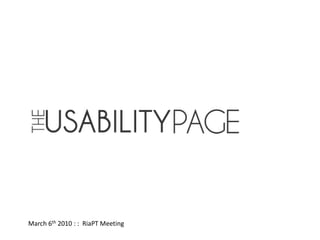
Evolution of Usability and the Future of User Experience
- 1. March 6th 2010 : : RiaPT Meeting
- 2. March 6th 2010 : : RiaPT Meeting
- 3. 1. Usability Evolution 2. What is next for Usability? 3. The Usability Page
- 4. 1. Usability Evolution (Well... Maybe we need to go a few steps back)
- 6. 0. Computer Evolution (shortly)
- 7. First Generation (1939-1954) vacuum tube Second Generation Computers (1954-1959) transistor Third Generation Computers (1959-1971) integrated circuit Fourth Generation (1971-1991) microprocessor Fifth Generation (1991 and Beyond) www The Evolution of the Computer by History Department at the University of San Diego
- 8. But what evolve? Processing (Faster) Disk Capacity Size
- 11. "Forty years ago, Caltech professor Carver Mead identified the corollary to Moore's law of ever- increasing computing power. Every 18 months, Mead observed, the price of a transistor would halve. And so it did, going from tens of dollars in the 1960s to approximately 0.000001 cent today for each of the transistors in Intel's latest quad-core. This, Mead realized, meant that we should start to "waste" transistors.” Chris Anderson
- 12. Great computer power! Amazing features! ... But how can I use it?
- 14. 1970’s work within an assumed process − tweaking at the end of the waterfall model − principal research objective was guidelines − first approaches to describe the user too costly & uninformative
- 15. 1980’s Iterative development vs. waterfalls − prototyping, mock-ups − formative evaluation (thinking aloud) − usability engineering and usability specifications User Models and theory (versus guidelines) − prior knowledge and problem solving Gradual better integration with UI technology
- 16. 1990’s User Experience is multifaceted, qualitative, field-oriented − participatory design − contextual design − ethnographically informed design Conceptual frameworks beyond user models Users drive/integrate system development lifecycle!
- 18. 2000+’s Usability now means money! Accessibility User Experience Information Architecture Findability Usability gets mainstream!
- 19. Devices
- 20. Books
- 21. Events
- 23. 2. What is next for Usability?
- 24. User Experience Honeycomb by Peter Morville
- 25. Usability Research and Testing will evolve a lot
- 26. Usability will get Social
- 27. 3. The Usability Page
- 39. Content References Chris Anderson on Transistor Waste http://www.wired.com/techbiz/it/magazine/16-03/ff_free?currentPage=2 The Evolution of the Computer by History Department at the University of San Diego http://history.sandiego.edu/GEN/recording/computer1.html Usability History by Introduction to Human-Computer Interaction Courses (Computer Science at Virginia Tech) http://courses.cs.vt.edu/~cs3724/spring2003carroll/lectureHandouts/1-SBDoverview.pdf User Experience Honeycomb by Peter Morville http://semanticstudios.com/publications/semantics/000029.php
